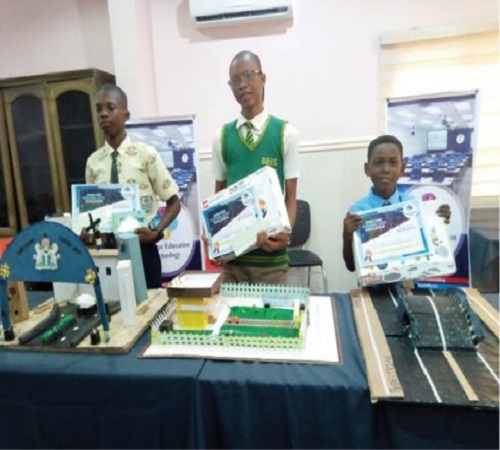The venue was Conference Hall, Conference Hotel, Ijebu-Ode, Ogun State, and the presenter was Oluwafayokunmi Olurinola, a 10-year-old student of Rosarium College, Ijebu-Ode, who had designed an interesting prototype, which he hopes will solve challenge of deplorable roads. Olurinola, the youngest of three finalists, held his audience’s attention for about ten minutes, while he battled to convince them on the feasibility of plastic roads in Nigeria.
The audience, comprising his co-contestants, teachers, and organisers of the tech contest tagged ‘Ijebu-Ode Future City Challenge’, were particularly enthralled by the confidence of the youngster who believes plastic roads have worked out in America, India and the UK, hence, Nigeria could tap in. Each of contestant, by the rules of the contest, was meant to design a prototype using materials which should cost no more than N1,000.
Olurinola’s prototype was made of nylon and carton, used to design a double-lane road, a flyover, with pedestrian and bike lanes. “The problem I have identified in Ijebu-Ode is bad roads and the solution I have is plastic roads,” said the youngster.
“They are cheap to construct, and they are waterproof, too. You’ll also need the second material, which is bitumen.” “Most roads get spoilt because water is left on the surface for a long time, which makes the road to crack,” the JSS I student said, as he submitted that if the model is adopted, it could solve environmental pollution threat posed by plastics.
When asked how a 10-year-old got his knowledge of plastic roads from, he responded: “When I heard about the competition, I thought of roads, and what could be done to make them better. And when I researched online, I learnt of plastics roads. I did more research, and came up with my own design of the prototype.”
On the feasibility of the model in Nigeria, “I think Nigeria is ripe for it. The plastic roads are being put to use in America, United Kingdom and India. I am sure Nigeria can do it too.” “My message to the government is that they should try to not only implement plastic roads, but also spearhead research into other things that can help develop our nation.”
Olurinola, who emerged overall winner with 159 points, was closely followed by Babasola Al-Meen, an SSS student of Baptist Boys High School, Abeokuta, who came second with 154 points. On his part, Al-Meen presented a prototype of a ‘Sustainable Smart City’, which utilises solar energy, among others. According to him, the model is meant to create a city where major amenities would be available using clean energy, in order to ensure sustainable and improved standards of living.
Al-Meen told us that it felt great to have emerged second in the competition, saying his performance would inspire other students from his school, and other public shools, to think outside the box. “I have a passion to change the world with tech innovations,” he told our correspondent.
The second runner-up, Lawal Ekundayo of Tai Solarin University of Education Secondary School, who scored 90 points, presented a prototype of Ijebu-Ode which showed the possibility of good network of roads, 24-hour electricity, and other amenities. The competition, according to organiser Exquitec Education Technology, an enterprise which enhances the use of technology in schools, is meant to identity problem-solving skills in teenagers.
The Chief Executive of Officer (CEO) of Exquitec Education Technology, Dr Kemi Olurinola said the competition to expose kids to critical thinking, problem solving and creativity. She explained that the participants were rated based on essay submissions, project overviews, video presentation, and a final pitch at the grand finale.
“The Ijebu-Ode Future City Challenge was organized for kids, to expose them to concepts and skills needed for the 21st century, and also to make them contributors, and not just consumers of technology. We look around and see how they can become solution providers for their communities and hopefully the world at large,” the CEO said.
Source: Dailytrust










